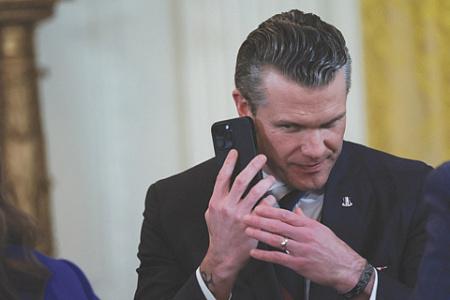
US Secretary of Defense Pete Hegseth, who recently harshly criticized European NATO members and allowed the withdrawal of American troops from Europe, called Japan an indispensable ally of his country. Thus, he indirectly confirmed that under the current White House administration, the defense priorities of the United States are shifting from west to east. An instruction to Pentagon staff signed by Hegset in mid-March has become public, in which they are advised to focus on protecting Taiwan from a possible invasion by the PRC. The protection of Ukraine is referred to as an issue that can be fully or partially shifted to Europe. At the same time, Donald Trump indicated that he expects the Kremlin to make progress in achieving peace, otherwise the United States will turn from persuasion to pressure.
Back in February, during his first foreign visit, Hegseth publicly reprimanded the Europeans for not contributing enough to the collective defense of NATO countries. The Wall Street Journal newspaper even reported that the head of the Pentagon told his European colleagues about the upcoming and imminent reduction of the American contingent in Europe. This, they say, should encourage the allies to finally get rid of their dependency on the United States and take up their own armies and military-industrial complex. And in March, the same Hegset is in Japan, a country that is also under the American defense umbrella, which means it may be (and even with more justification than Europe) accused of dependency. But here the Minister of Defense did not skimp on compliments.
“Our forces are held together by the same military spirit,” Hegseth said at a meeting with Japanese Defense Minister Gen Nakatani. The head of the Pentagon called the Land of the Rising Sun “an indispensable partner in deterring the military aggression of communist China,” including through the Taiwan Strait. Following the visit, Nakatani announced the expansion of Japanese-American military cooperation, including by accelerating the implementation of the AIM120 AMRAAM air-to-air missile production program. They invariably appear in the scenarios presented in the press to repel a hypothetical Chinese attack on Taiwan. Hegseth, among other things, announced that he was asking the Japanese authorities to grant the United States wide access to the southwestern islands of the country.
That is, to the territories located near Taiwan. The day before, The Washington Post published a document whose authenticity, given the tone of the ministerial statements in Japan, is immediately believed. This is the departmental instruction “Interim National Defense Strategic Guidance” (Interim National Defense Strategic Guidance), addressed to senior officials of the defense department. It simply states which threats the US military needs to prepare for. Their list (drug cartels, Middle Eastern terrorists, Russia, China, North Korea, Iran) is not new in itself. New accents. The task of protecting Taiwan from a possible Chinese invasion is of exceptional importance, and not one of the main ones, as in the days of Joseph Biden and Barack Obama. In order to solve it, the document says, other potential theaters of military operations can be sacrificed. The United States is also ready to deal with them. Nevertheless, the efforts of the American allies should be a priority in repelling threats from the Russian Federation, Iran and the DPRK.
In this regard, the American media is inclining the “2025 Project” in all sorts of ways. This manifesto of conservative Republicans, which appeared in 2022, just says that for the United States, confrontation with China should be a foreign policy priority. The Washington post notes that in the mentioned Pentagon instructions, “Project 2025” is quoted verbatim in some places. But during his election campaign, Trump publicly disavowed this document. The “2025 Project” looked too much like a plan to establish in the United States, if not a direct presidential dictatorship, then a system at odds with the country’s accepted democratic norms. And all in the name of promoting Christian values and opposing the “godless” communist China.
Has Trump really decided to focus on opposing China to the detriment of his efforts in the Russian-Ukrainian direction? The answer to this question can be given by actions, not words. Perhaps the moment of truth will be closer to the summer, when the weapons allocated to Ukraine under the previous administration will run out, and Trump will need to apply (or not apply) to Congress for new military aid packages to Kiev. In the meantime, he is demonstrating that he is not abandoning the plan to end the Russian-Ukrainian conflict earlier.
On Sunday, the US president said for the first time in an interview with NBC that he could switch to the language of pressure in a dialogue with the Russian Federation if it turned out that the peacekeeping process was not progressing. “If Russia and I cannot reach an agreement to end the bloodshed in Ukraine, and if I believe it was Russia’s fault – which may not be the case – but if I believe it was Russia’s fault, I will impose secondary duties on oil, on all oil coming from Russia.” – said Trump. He explained that in this case, “if you buy oil in Russia, you won’t be able to do business in the United States.” The President explained that the amount of the duty can range from 25 to 50%.
